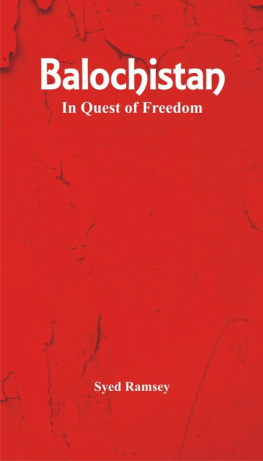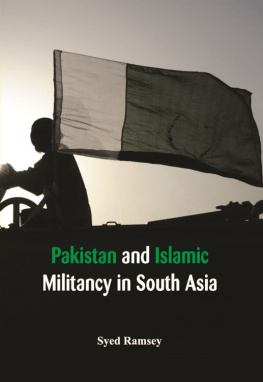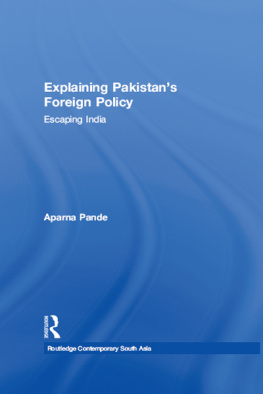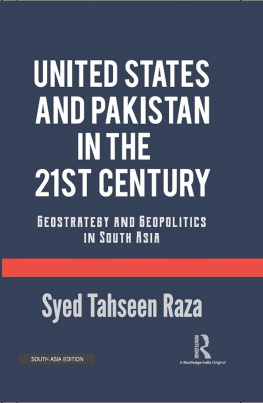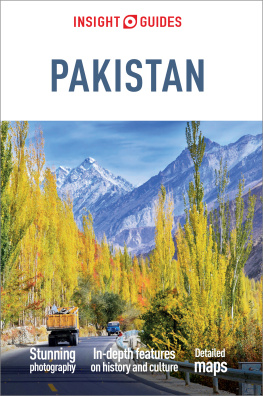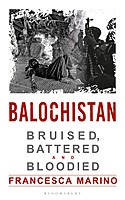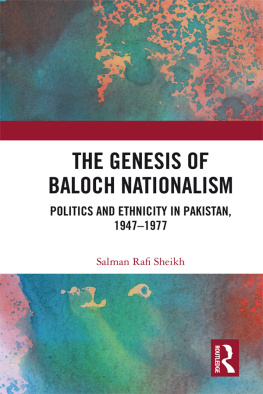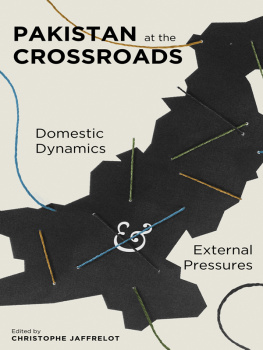Balochistan
In Quest of Freedom
Balochistan
In Quest of Freedom
by
Syed Ramsey
Alpha Editions
Copyright 2017
ISBN : 9789386367488
Design and Setting By
Alpha Editions
(A Vij Publishing Group Company)
www.vijbooks.com
email - contact@vijpublishing,.com
All rights reserved. No part of this publication may be reproduced, distributed, or transmitted in any form or by means, including photocopying, recording, or other electronic or mechanical methods, without the prior written permission of the publisher.
The views and characters expressed in the book are of the author and his/her imagination and do not represent the views of the Publisher.
Contents
Preface
1. Introduction
2. Strategic, Social and Political Values of Balochistan
3. Baloch Movement of Freedom
4. Baloch Nationalism and Freedom
5. Development and Progress in Balochistan, Pakistan
6. Balochistan in Indias Pakistan Policy
7. Pakistan and China Economic Cooperation in Balochistan
8. Balochistan Insurgency
9. Politics of the Conflict in Balochistan
10. Balochistan Crisis
11. Security Cooperation in Balochistan
Bibliography
Index
Preface
Balochistan is a tinderbox which has hitherto remained more or less unexposed to geo-political pressures -- either because of Indian docility or because of Pakistan's deft foreign policy or because it was not useful to the West.
Balochistans liberation movement has its origin in the messy manner of the provinces integration with Pakistan in 1948 and is fuelled by Baloch alienation, a sense of their aspirations being crushed by the 1947-formed country. Embers of frustration have surfaced from time to time, most recently after the cave-blast killing in August 2006 of Akbar Bugti, Balochistans former chief minister-turned-rebel and Brahumdagh Bugtis grandfather.
Balochistan is Pakistan's soft underbelly our neighbour's nukes are hidden in the region, where the Pakistani state faces the most hostile population. Hence stronger control over the affairs of Balochistan strengthens India enough to bring nuclear-armed Pak to its knees. Additionally, it is immensely important to make Pakistan a nuclear-free zone because of the likelihood of the nuke arsenal ending up in the hands of non-state actors
The Punjabi-dominated Pakistani armed forces have launched ethnic cleansing in Balochistan against the ethnic Baloch people; they are systematically kidnapping, imprisoning and murdering Baloch nationals by the thousands. Balochistan is Pakistan's soft underbelly - our neighbour's nukes are hidden in the region, where the Pakistani state faces the most hostile population.
All the matter is just compiled and edited in nature. Taken from the various sources which are in public domain.
The book covers the developments in post colonial Balochistan, its geopolitical significance, and the underlying grievances of the Baloch.
Editor
Introduction
Balochistan , has the largest area of Pakistans four provinces, constituting approximately 44% of the countrys total land mass, and the smallest population, being home to less than 5% of the countrys population. Balochistan province is bordered by Afghanistan to the north and north-west, Iran to the south-west, the Arabian Sea to the south, Punjab and Sindh to the east, and Khyber Pakhtunkhwa and Federally Administered Tribal Areas to the north-east. Quetta is the capital and largest city of Balochistan.
The main ethnic groups in the province are Baloch, Pashtuns and Brahuis, and there are relatively smaller communities ofIranian Baloch, Hazaras, Sindhis and other settlers, including Punjabis, Uzbeks, and Turkmens. The name Balochistan means the land of the Baloch in many regional languages.
History
Balochistan occupies the southeastern-most portion of the Iranian Plateau, the site of the earliest known farming settlements in the pre-Indus Valley Civilization era, the earliest of which was Mehrgarh, dated at 7000 BC. Before the arrival of Islam in the 7th Century, Balochistan was ruled by the Paratarajas a Parthian dynasty representing the House of Suren. At certain times, the Scythians and Kushans also held political sway on parts of Balochistan controlling it through local governors called Satraps.
Like other modern South Asian ethnic groups claiming Middle Eastern roots, the Baloch assert that they are descended from Amir Hamza, a paternal uncle of the Islamic Prophet Muhammad. They consistently place their first settlement in Aleppo, where they remained until they sided with the sons of Ali, took part in the Battle of Karbala, and were expelled by Yazid, the second Umayyad Caliph, in 680 A.D. They went to Kerman, and eventually to Sistan, where they were hospitably received by Shams-ud-Din, ruler of that country. According to Mansel Longworth Dames there was a Shams-ud-Din, an independent Malik of Sistan, who died in 1164 A.D., almost 500 years after the Baloch migration from Aleppo. Shams-ud-Din claimed descent from the Saffarids of Persia. His successor, Badr-ud-Din (of whom there is no known historic record), demanded a bride from each of the 44 bolaks or clans of the Baloch. The Baloch, however, had never paid tribute in this form to any ruler; they instead sent Badr-ud-Din 44 boys dressed in girls clothes and fled before the deception could be discovered. Badr-ud-Din sent the boys back but pursued the Baloch, who had fled south-eastwards into Kech-Makran, where they defeated him. During this period Mir Jalal Khan, son of Mir Jiand Khan, was the ruler of the Baloch. He left four sons, Rind, Lashar, Hooth, and Korai, and a daughter Jato, who married his nephew Murad. These five are the eponymous founders of the five great divisions of the tribe, the Rinds, Lasharis, Hooths, Korais, and Jatois.
Another theory of the origin of the Baloch people is that they are of Median descent , and are a Kurdish group that has absorbed Dravidian genes and cultural traits, primarily from Brahui people. With time, Baloch tribes linguistically absorbed all the local people in Makran, southern Sistan and the Brahui country, becoming rival in size to the other Iranian-speaking groups in the region.
In 654, Abdulrehman ibn Samrah, governor of Sistan and the newly emerged Rashidun caliphate at the expense of Sassanid Persia and the Byzantine Empire, sent an Islamic army to crush a revolt in Zaranj, which is now in southern Afghanistan. After conquering Zaranj, a column of the army pushed north, conquering Kabul and Ghazni, in the Hindu Kush mountain range, while another column moved through Quetta District in north-western Balochistan and conquered the area up to the ancient cities of Dawar and Qandabil( Bolan). By 654, the whole of what is now Balochistan was controlled by the Rashidun Caliphate, except for the well-defended mountain town of QaiQan which is now Kalat. However, this town was later conquered during the reign of Caliph Ali. Abdulrehman ibn Samrah made Zaranj his provincial capital and remained governor of these conquered areas from 654 to 656, until Uthman was murdered.
During the Caliphate of Ali, revolt broke out in southern Balochistans Makran region. Due to civil war in the Rashidun Caliphate, Ali was unable to deal with these areas until 660, when he sent a large force, under the command of Haris ibn Marah Abdi, towards Makran and Sindh. Haris ibn Marah Abdi arrived in Makran and conquered it by force, and then moved northward to north-eastern Balochistan and reconquered Qandabil (Bolan). Finally, he moved south and conquered Kalat after a fierce battle. In 663, during the reign of Umayyad Caliph Muawiyah I, Muslims lost control of north-eastern Balochistan and Kalat when Haris ibn Marah and large part of his army died in battle against a revolt in Kalat. Muslim forces later regained control of the area during the Umayyad reign. It also remained a part of the Abbasid Caliphate.

